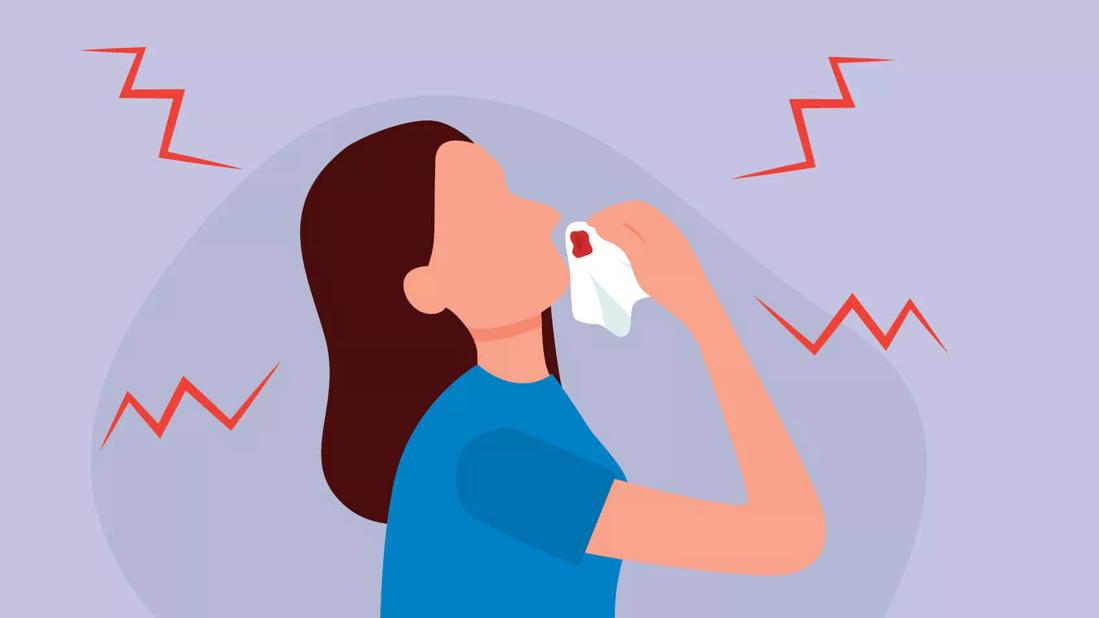Seek help if bleeding doesn’t stop or they’re interfering with your life

Nosebleeds happen. And they don’t seem to care whether it’s a convenient time for you. There’s just that rush of blood and then a race to contain it. If you frequently get nosebleeds, you probably know all too well the sense of urgency, embarrassment and concern.
Advertisement
Cleveland Clinic is a non-profit academic medical center. Advertising on our site helps support our mission. We do not endorse non-Cleveland Clinic products or services. Policy
The question on your mind (after “How do I make it stop?”) is probably along the lines of “Should I be worried about a nosebleed?”
Otolaryngologist Brandon Hopkins, MD, says most nosebleeds aren’t reason to worry, but there are times when it’s a good idea to seek help from a healthcare provider.
It’s understandable to be worried when your nose starts bleeding. Blood coming out of your nose just seems unnatural at best and downright horror-movie-esque at worst.
But be rest assured that most nosebleeds look more dramatic than they really are.
“Think about if you put just a drop of blood in a toilet bowl — the whole bowl goes red,” Dr. Hopkins illustrates. “It doesn’t take a lot of blood to look like something extreme. We usually vastly overestimate the volume of blood that’s present.”
So, no, you’re probably not in danger of “bleeding out” (and if you were, there’d be no doubt that you’d need medical attention.) But still, your typical nosebleed may be an indication that something isn’t quite right.
It may just be that your nose is irritated by things like allergies, dry air or your nose spray. But it could be something more.
Dr. Hopkins lists three times when nosebleeds deserve medical attention:
Advertisement
Let’s take a closer look at worrisome nosebleeds and what may be happening.
How long a nosebleed lasts is one of top considerations when determining whether it’s something to worry about. Nosebleeds that last longer than 20 minutes can be cause for concern.
But what you do to attempt to curb the bleeding in those 20 minutes matters.
Here’s how to know if your nosebleed is lasting too long.
When your nose starts bleeding, your first order of business is to encourage a clot to form. That’s done by holding pressure on your nostrils.
“If you’re holding enough pressure in the right spot, it won’t be able to bleed anymore,” Dr. Hopkins explains. “You want to compress the site of bleeding.”
Dr. Hopkins suggests these steps to encourage the bleeding to stop.
Now, time can feel a little different when you’re worrying about the blood streaming from your nose, so use a timer. What may feel like an eternity might actually only be a few minutes.
It’s important to avoid the temptation to release pressure before those 10 minutes are up. Because every time you peek to see if it’s stopped, you need to restart the clock.
“It’s going to feel weird and uncomfortable to hold your nose for a full 10 minutes. It’s not an easy task,” Dr. Hopkins acknowledges. “But it takes eight to 10 minutes for fibrin proteins in your blood to start to form a clot to stop the bleeding. If you let go, it just washes out that developing clot and your body has to start all over again.”
If after two rounds of holding your nose for 10 minutes, the blood is still flowing, it’s time to get prompt attention at an emergency room or urgent care.
Once there, healthcare providers may treat your nosebleed by packing it with something like gauze or special nasal sponges. (Note that while some people might tell you to put something like tissues or tampons in your nose to absorb the blood, Dr. Hopkins advises against that. You’re more likely to irritate the lining of your nose and cause even more bleeding. Leave that to the pros.)
Advertisement
In some cases, providers may recommend cauterization to seal off the bleeding blood vessel.
Wondering how many nosebleeds is too many? It’s a judgement call, really — one that may vary from person to person. But if frequent nosebleeds are affecting your life, a visit to an otolaryngologist (a specialist in conditions of the ears, nose and throat) is in order.
“For example, if your child is having nosebleeds twice a week and has to leave their classroom for a half hour to address them, they’re missing out on school time. That’s a reasonable cause to get checked out,” Dr. Hopkins says. “Or if you’re waking up in the middle of the night with bloody sheets for some time, that’s going to be enough for some people to say that’s past the threshold of what’s acceptable for them.”
Recurring nosebleeds in kids could be from something like your child could be picking their nose (gross by true). That’s particularly common in cold weather when their nose is more likely to feel dry.
Kids and adults with frequent nosebleeds may be from nothing more than dry air irritating their nose. In those cases, you might benefit from some simple changes to moisturize your nasal passages, like a saline spray or a lubricating nasal cream.
Advertisement
If those measures don’t do the trick, talk with a healthcare provider. They may look for things like a deviated septum or less-common causes for frequent nosebleeds, like nasal tumors, bleeding disorders or a condition called hereditary hemorrhagic telangiectasia, a genetic disorder that affects blood vessel formation. Frequent nosebleeds in adolescent males may, rarely, be associated with a benign tumor called juvenile nasopharyngeal angiofibroma.
For people with certain conditions, your threshold for seeing a provider should be lower than most. That includes people who’ve been diagnosed with a bleeding disorder (also called a bleeding diathesis), like hemophilia or Von Willebrand disease. Or if you have a bloody nose and take blood-thinning medication.
“If you have a bleeding condition or if you take blood-thinners or aspirin regularly, it’s harder to stop bleeding once it starts,” Dr. Hopkins explains. “Working with an otolaryngologist can help you figure out appropriate mitigation strategies for you, like steps to keep your nose very moisturized to try to prevent them and then having a plan and action plan for when nosebleeds happen.”
Most nosebleeds clear up on their own with a few minutes of pinching (without peeking). But if the bleeding doesn’t clear up or nosebleeds are impacting your life, a trip to a provider can make a big difference.
Advertisement
Learn more about our editorial process.
Advertisement

If your nose is constantly running, it could be allergies, chronic sinusitis, nasal polyps or other concerns

Allergies, indigestion and the effects of gravity can all mess with your nose at night

Staying calm, sitting up straight and gently pinching the sides of your nostrils can help a bloody nose go away faster

Dry air, allergies or nose-picking may be to blame for nighttime epistaxis

Take care of your runny or stuffy nose by staying hydrated, using a humidifier and considering a medication

Allergies, acid reflux and even pregnancy can increase drainage and upset your stomach

It’s usually the way your nose manages airflow, but sometimes, it could be other issues

Correct positioning is one of the keys to getting the best results

Wearing a scarf, adjusting your outdoor activities and following your asthma treatment plan can help limit breathing problems

Your diet in the weeks, days and hours ahead of your race can power you to the finish line

When someone guilt trips you, they’re using emotionally manipulative behavior to try to get you to act a certain way